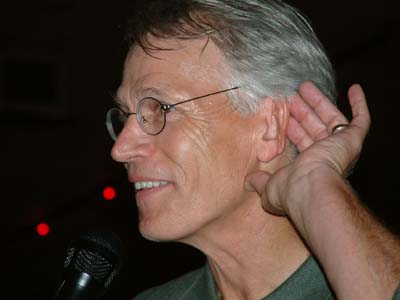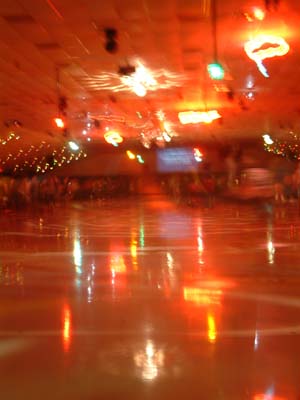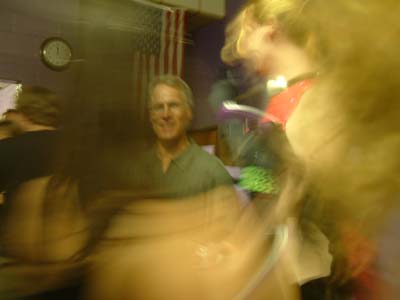‘What was it like to kiss Olivia?’
He chuckles. ‘Well, I’d just gotten engaged to my wife.’
‘Were the legwarmers to hide Olivia’s thick ankles?’ asks someone else.
‘I plead the fifth!’ he says.
No one quite knows what to ask Michael Beck, because no one knows anything about him. Everything that came after 1980—the wife and two kids, the decades of television cameos and reading books on tape—is invisible. To the crowd assembled here, wearing hair ribbons and roller skates, Michael Beck is still Sonny Malone, a frustrated artist who falls in love with a comely muse on roller skates played by Olivia Newton-John. The crowd of twenty- and thirty-somethings is trying to reconcile that Michael Beck—the shirtless vests, the Andy Gibb good looks—with this silver-haired gentleman in a loose sweater and fitted slacks.
‘What are you doing now?’ someone shouts.
‘I’m writing a novel.’
No one asks him what it’s about. They do, however, repeatedly ask him to roller-skate.

Beck has come to Austin, Texas, for an odd kind of celebration. Odd because the film being honored is 23 years old and largely considered one of the worst movies ever. The London Evening News called it ‘the most dreadful, tasteless movie of the decade. Indeed, of all time.’ And yet, it is beloved by the people gathered here tonight. They know the lyrics, they know the dances. For them (okay, for us) it has some ineffable pull. It calls to us with its familiar, soaring songs. It calls to us with its legwarmers, its turquoise and pink, its zebra stripes. It calls to us from another age entirely, from a moment when the sun shone neon.
And we call it Xanadu.
This kind of fandom was just what Universal hoped for when they released the film. They had launched a then-unprecedented marketing blitz, including television specials and even a Xanadu clothing line. MCA Records president Bob Singer boasted that by the time Xanadu came out, everyone in America would have heard the name six to eight times. One studio head boldly pronounced, ‘We all know that Saturday Night Fever and Grease saved our business in 1978, and Xanadu will save it in 1980.’
Xanadu was unsinkable. Like the HMS Titanic.
The film began as a modern, roller-skating version of the 1947 Rita Hayworth romance Down to Earth, about a muse named Terpsichore who charms a Broadway director into rewriting his upcoming play and, in so doing, produces a flop. But Xanadu certainly had its own share of script changes— after the 1979 films Skatetown U.S.A and Roller Boogie capitalized on the skating phenomenon, executives frantically tried to spin Xanadu as a ‘timeless romance.’
‘We really wanted to make an old-fashioned Hollywood musical,’ producer Lee Kramer said. Of course, there was the small matter of all those roller skates.
Critics savaged the film upon its release. And yet, to a certain niche audience, Xanadu was nothing short of magic.
I was six years old when I saw Xanadu in the theatre. For months afterward, I danced in my bedroom to the soundtrack—a joint effort by ELO and Olivia Newton-John—with my feet brushing across the red shag carpet, my arms swiveling overhead. ‘Have to believe we are magic! / Nothing can stand in our way!’
‘Magic,’ #1 in the summer of 1980, was a fitting anthem for a generation of girls who dreamed of waking up one morning, walking over to the mirror, and finding Olivia Newton-John’s face in the reflection. We dressed like her. We wore our makeup like her. Her magical transformation in the Grease—from gawky to goddess—was an endless source of false hope. When Livvy appeared in the video for ‘Physical’ with short hair and a headband, I snipped off my long curly locks and wrapped a ribbon around my forehead. It was a grave and painful miscalculation.
‘Sarah got in a fight with the weed whacker, and the weed whacker won!’ a kid in my class joked the next day. Looking back on my life, I can see it was the moment when everything turned sour.
But two decades later, I wasn’t thinking about any of that. I was browsing through a record store in 2001 when I found the familiar blue-and-maroon CD case. This old thing? I turned it over to find the songs like old friends—‘I’m Alive,’ ‘Suddenly,’ ‘Don’t Walk Away-ee-ay.’ I felt a familiar tug, as though I had to pee, or blast ELO till my face melted. At home, listening to the ancient songs in my bedroom, I knew I had found a kind of Rosetta Stone to my youth. ‘The love, the echoes of long ago / You needed the world to know / They are in Xanadu.’ I was six years old again. I was in love. And I wasn’t the only one.
Around the turn of this century, after spending decades as a punchline, Xanadu made a comeback. Midnight screenings packed in audiences. In Los Angeles, there was Xanadu Sing-Alongs and Xanadu Live! actress Amy Pietz’s tongue-in-cheek stage version of the film. ELO’s Jeff Lynne, who had long distanced himself from the whole miserable project, released Flashback, featuring his own performance of the infamous title track. Olivia Newton-John’s longtime composer John Farrar was reportedly at work on a Broadway version of the show. Reed Johnson’s 2002 Los Angeles Times piece about Xanadu obsession christened the film’s renaissance as a genuine cult phenomenon, dubbing its legion of fans ‘Museheads’ (a term I hadn’t heard before or since).

In Austin, a local comedy troupe played to sold-out theatres every night by roasting Xanadu as it played on screen. The attitude toward the film was one of tender disdain—mocking the bad acting and limp, almost-nonsensical script while acknowledging a certain dopey charm. It’s certainly a bad movie by any critical standards. And yet, whenever I see Xanadu, I am struck by the ambitiousness of its discrete parts. A brilliant soundtrack by ELO. Glorious gel-backlighting. Gene Fucking Kelley. A long (albeit pointless) animated sequence by Don Bluth in which the lead characters turn into fish and birds. In one fantasy sequence set to the song ‘Dancin’,’ two separate musical numbers—‘80s rock (performed by the Tubes) and ‘40s swing—literally become one, the sounds and the sets merging together. It’s not the crane shot from Goodfellas, but hey, it’s not bad.
Some Xanadu fans go much further in defending the film. When William S. Repsher tossed off a clever rip on Xanadu for Leisure Suit in 1999, it kickstarted an epic and unironic conversational thread that is still going on today.
‘XANADU IS THE BEST MOVIE I HAVE EVER SEEN!’ one writes.
‘I find it extremely hard to believe that anyone could possibly love this movie more than me!’ writes another. ‘I would breathe, sleep, live, and even EAT Xanadu if it were at all within my power. Just ask my little dog, Sonny Malone.’
The site has become a meeting ground for the film’s rabid fans, and reading through the 60,000-word-plus thread is a jaw-dropping example of the Internet’s ability to bring like-minded lunatics together. Months after his review ran, author Repsher marveled at the overwhelming number of emails he’d received, and wrote, ‘The continued response to this article is a sure sign that the apocalypse is nigh upon us.’
It’s four years later, and the fans aren’t done yet.
‘That feeling that I get from watching, hearing, or talking about [Xanadu] just can’t compare to any drug I’ve had!’ writes one. ‘And trust me, I’ve experienced them all!’
In the film, Xanadu is the name of a roller disco with the power to transcend time. In the finale, after Olivia Newton-John descends from her neon cage in heaven for one last appearance on earth (long story), she performs a series of musical numbers that whisk her through various epics—from ‘30s cigarette girl to Old West cowgirl to futuristic goddess—as though this place, this Xanadu, could literally transport her.
Of course, this is just a metaphor for what music does in our lives. Just a few well-chosen notes and we can plummet through the trapdoor, find ourselves in another world entirely. Back in childhood, back in love. In a roller-rink in Austin, perhaps, listening to Michael Beck.

‘I have found over the years that there are tons of people for whom this movie really means something,’ Beck says. For decades, director Robert Greenwald has received fan mail from teenage girls praising the film. Which is to say, critics be damned, maybe Xanadu is a timeless romance. It’s hard to imagine that the Great Films of 1980—Ordinary People, which won Best Picture, or Raging Bull, which should have—would attract so many to the Playland Skate Center on a Thursday night. And their audiences certainly wouldn’t be wearing white toga dresses.
Later, after the Q&A, the skaters return to the rink. Some of them hold hands. Some of them skate backward. Some of them topple and fall spectacularly, spinning to a stop on the ground like a breakdancer.
The DJ has saved the best song for last. The lights dim and the neon throbs as the skaters blur past, arms swiveling overhead. Their lips mouth the familiar sounds. ‘And they call it Xan-uh-doooo-uuh-oooh. Uh-OOH-ooh.’


